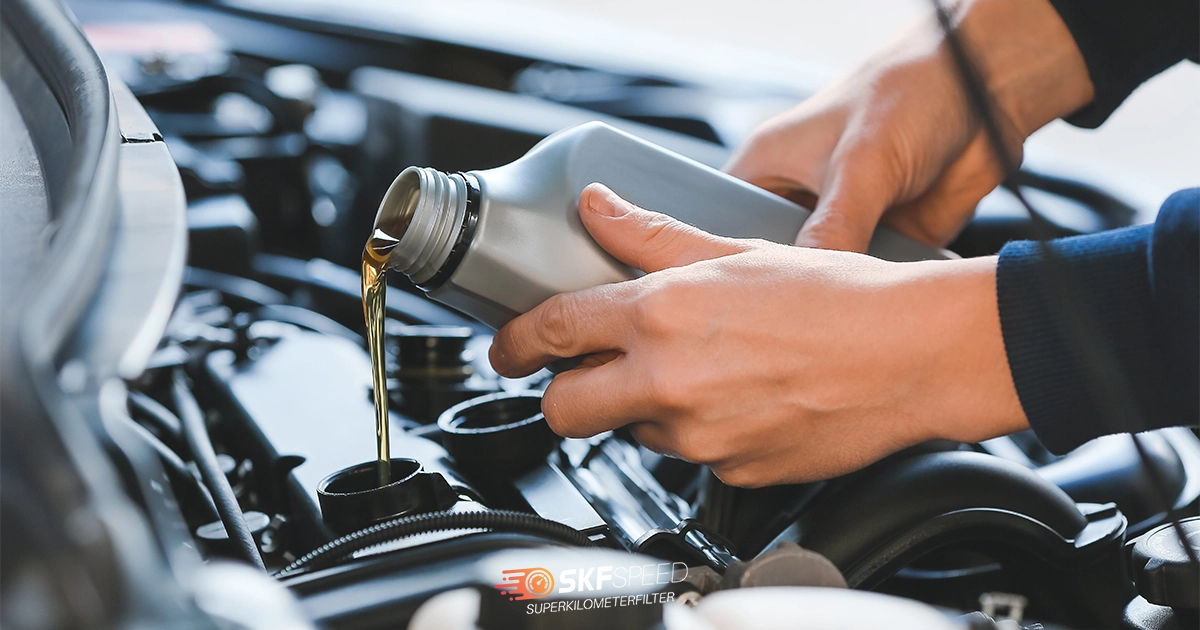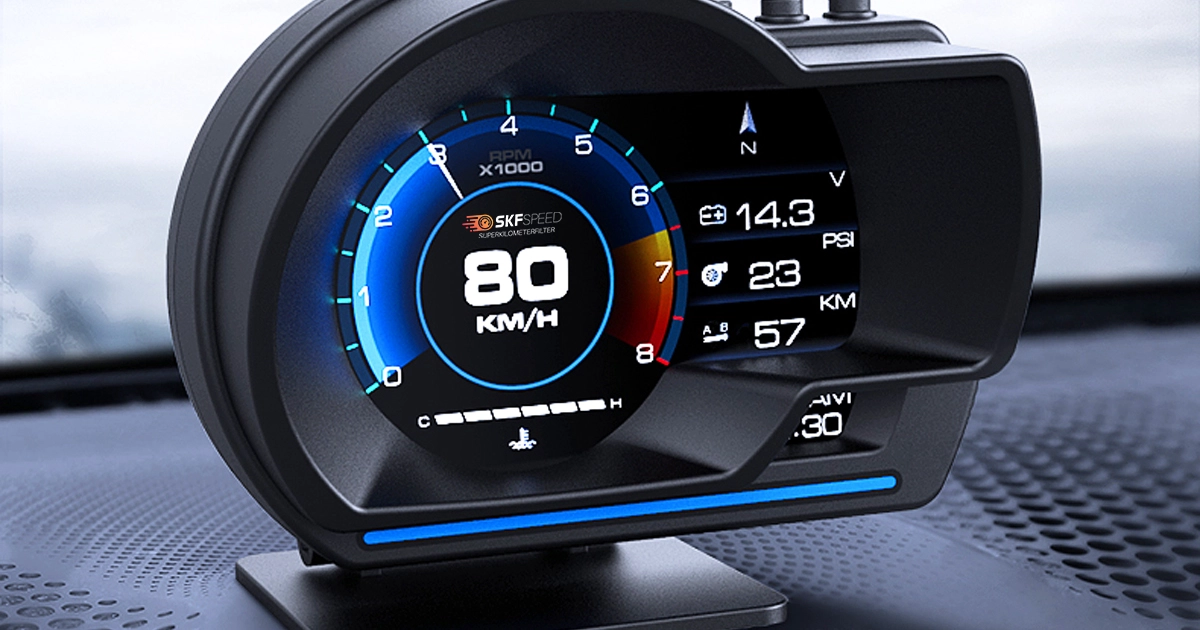
Synthetic oil mileage milestone is mostly discussed as an automotive topic, as long as engine oil is the core part of vehicle well-being. Typically, these oil change intervals range from 7,500 to 10,000 miles (or more), depending on the driving conditions, car manufacturer, owner’s manual, or oil brand. There are many misconceptions related to the topic; some claim that a synthetic type of lubricant is universal and lasts a lifetime. It is usually made up of advanced chemical components, which makes it really outstanding; however, does it really improve MPG? Can we have it “forever”? does it really cause leaks?
In the following blog, we will discuss the widespread myths surrounding synthetic oil change mileage and attempt to separate fact from fiction.
Full synthetic oil mileage typically refers to the distance your vehicle can travel before the oil needs to be changed. This figure is not entirely exact to state in advance; however, as the producer of an advanced type of lubricant claims, a car engine consuming synthetic lubricant can travel between 7,500 and 10,000 miles, and sometimes even 15,000 miles. Milestones are higher or lower, depending on the car, its maintenance, or the manufacturer’s recommendation.
Generally, there is a strong correlation between the mileage and car/engine maintenance, because a car usually lasts longer and travels a greater distance when its core components are well-maintained throughout its lifespan. Using high-quality lubricants is crucial for maintaining the automobile properly.
Synthetic oil change mileage mostly depends on various factors, including vehicle age, manufacturer’s recommendation, driving conditions/habits, and engine type. Milestones differ in different circumstances:
5,000–7,500 miles is typical for high-performance or diesel engines
Drivers who always maintain steady speeds and have highway trips mostly reach 10,000+ miles, while aggressive drivers reach only 5,000 miles before changing.
Newer cars have an advanced monitoring system that notifies owners of optimal timing for lubricant replacement. Older cars typically require maintenance every 5,000–7,000 miles.
Manufacturers usually claim that typical modern vehicles reach 7,500–10,000 miles before a motor oil change, while High-performance/luxury models reach 12,000–15,000 miles.
There is considerable controversy and misinformation surrounding engine oil and full synthetic oil mileage. Usually, this happens because many people mix fake and genuine information they have heard from the automotive industry, and it is becoming increasingly difficult to distinguish between them.
In the following list, we will discuss the most popular myths and realities behind them.
You may have heard from many automotive enthusiasts that high-mileage synthetic oil may cause leaks, especially in older vehicles. This misconception comes from the fact that in earlier times, when synthetic oil first appeared, it was formulated in a way that could shrink and then swell engine seals. Nowadays, modern synthetic oils are highly effective at cleaning without harming the engine. If someone says that it caused leaks, it mostly indicates that the engine has already had an issue.
Nowadays, there are top-quality brands that offer excellent performance without harming the components. Those brands are: Valvoline, Castrol EDGE, Mobil 1 Extended Performance, Pennzoil Ultra Platinum.
The myth is the result of dealership marketing campaigns regarding synthetic oil mileage and a misunderstanding of manufacturers’ requirements.
Manufacturers always recommend in the owner’s manual that they use only OEM-approved oil. OEM refers to Original Equipment Manufacturer, which means that the manufacturer has tested specific oil and deemed it reliable and acceptable for their vehicle model. However, it doesn’t mean that you should stick to one oil brand to keep the warranty valid. The point is to use the type of oil that has the relevant viscosity and quality that the manufacturer requires.
Sometimes, consumers are the victims of dealership marketing. Dealerships often say that upgrading oil is risky.
The reality is straightforward. There is no direct evidence that high-quality oil has a direct effect on the car warranty. The following facts support this statement:
In the USA, the law protects product warranties; The act is called the Magnuson-Moss Warranty Act. According to the act, consumers have no specific obligation to use branded vehicle parts or lubricants to maintain the warranty. They can rely on an independent repair service to do maintenance. The key is to use parts and oil for the automobile that satisfy all important criteria.
The same laws are in place in other regions to protect consumers’ rights. For example, European consumer law for the EU implies that warranty validation doesn’t depend on the specific brand. The main point is to opt for an oil brand that meets high standards.
Using the premium quality lubricant at the synthetic oil change mileage landmark has a positive impact on the car’s well-being, as it exceeds even manufacturers’ recommendations.
This statement is not entirely fiction. According to the study, high-quality motor oil can improve a vehicle’s mpg. The improvement is approximately 1-2%, not significantly larger. Marketers always emphasize the role of synthetic oil in improving fuel efficiency. It is undeniable that impact is real, as long as friction reduction is evident, drivers expect a dramatic improvement in MPG. According to an AAA study, fuel efficiency improves on average by 2 % after switching from conventional oil. How does it translate into real-life figures? Below, let’s do the calculations and see how much is saved.
Scenario 1 ( Conventional oil)
Let’s say:
Your car gets 24 mpg with conventional oil
Annual mileage: 10,000 miles/per year
Fuel cost: $3.50 per gallon
Used fuel:10,000 ÷ 24 = 416.67 gallons
Fuel cost = 416.67 × $3.50 = $1,458.33
Scenario 2 (full synthetic oil mileage)
Same Mpg: 24
Same annual mileage: 10,000 miles/per year
Same fuel cost: $3.50 per gallon
Mpg upgrades from 24 to 24.48 mpg (due to the 2% rise)
Fuel used = 10,000 ÷ 24.48 = 408.50 gallons
Fuel cost = 408.50 × $3.50 = $1,429.75
Annual Savings is as follows:
$1,458.33 (with conventional) − $1,429.75 (with synthetic) = $28.58 saved per year.
So , upgraded oil shows us improvement, but not as big as many drivers believe.
Premium-quality lubricant is the best way to take care of your engine, but never trust recommendations that encourage skipping scheduled maintenance tasks. Certainly, top-quality oil can last longer and serve better, but it does not guarantee a lifetime. Skipping synthetic oil mileage milestone can lead you to the following negative consequences:
Surely, the colour of the oil doesn’t always indicate contamination. Many drivers think that if the oil colour gets darker, it no longer does its job. It is a false assumption and it is why:
Oil becomes darker when it works and circulates in the engine, which means that it picks up carbon and byproducts of combustion, separating them from the moving engine parts. When it comes to contamination and oxidation, it is more than just darkening. Contamination is obvious when oil texture is gritty, thick sludge, or a burnt smell.
Knowing the correct mileage is always beneficial, but it becomes even more important when the topic is synthetic oil change mileage. It is not surprising to say that scheduled maintenance greatly depends on mileage milestones. If you misinterpret the mileage data for some reason, it will jeopardize the whole plan for scheduled oil replacement. The result will be bad timing and incorrect identification of maintenance necessities.
What is the reason for the incorrect mileage showing? There are many reasons for this, ranging from odometer breakdown to pre-planned odometer correction.
Most individuals correct the odometer for a legitimate purpose. For example, when odometer needs calibration, because it doesn’t show correct mileage and speed after changing tires. It is an absolutely understandable situation. Another reason may be testing the performance of the automobile after tuning. For this purpose, many individuals use an advanced device – Mileage blocker, which is able to halt the mileage recording process without leaving a trace, which means it is a perfect solution for testing the automobile without worrying about additional miles. The device serves a completely legal purpose when used in a controlled environment.
Mileage blocker is available on the Super Kilometer website. You can purchase the compatible device, designed for the specific maker and model, directly from the website and at the same time get answers to your questions from the customer service team. The tool is outstanding for several major specifications:
As we have already mentioned, the device is legal; however, if the individual uses it and conceals the genuine accumulated mileage, it becomes unethical for the next vehicle owner. As the device doesn’t leave any trace, the only way to know about past usage is to ask the seller. If you are not informed correctly, you will miss maintenance necessities, including full synthetic oil mileage intervals.
You can get an answer to this question if the buyer of the automobile chooses to be honest and admit to using the device. If you are unsure of the accuracy of the mileage data, please double-check it with the vehicle’s seller. If the seller used the device for testing purposes, he will admit it, and you will not face the unforeseen issues.
Synthetic oil mileage intervals are crucial for maintaining vehicles in optimal shape. Delaying or skipping it has adverse consequences for the vehicle’s well-being. You may delay or skip it because you have prejudices about it. Therefore, it is essential to separate engine oil myths from reality and adhere to the optimal replacement intervals.






Here you will find all the details about our company
Here you will find shipping and return related information
Here you will find information on all technical questions
Here you will find helpful information about installation